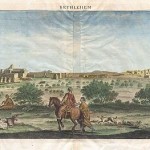 The Gospel According to Zephaniah (and Tom Waits)
The Gospel According to Zephaniah (and Tom Waits)
Daily Advent Reflection.
Debra Dean Murphy.
Zephaniah 3:8-13.
Thursday, December 22, 2011
“On that day you shall not be put to shame because of all the deeds by which you have rebelled against me” – Zeph. 3:11
“There’s no eye for an eye, there’s no tooth for a tooth. I saw Judas Iscariot carrying John Wilkes Booth.”
– Tom Waits, “Down There by the Train”
Listen: [ Youtube ] [ Spotify ]
These daily Slow Church Advent Reflections are based on the Daily Readings of the Revised Common Lectionary (Year B). We love for you to read and reflect along with us!
To keep up with this daily Advent series, follow SlowChurch.com on FACEBOOK or TWITTER.
We live in a score-keeping, tit-for-tat world. We thrive on retribution in our politics, our entertainment, our personal (and often petty) dramas. We live by the law of karma—or at least we secretly wish karma to be true: goodness sown reaps goodness and evil, we hope, will be repaid for evil. (We find karma especially appealing when pondering the actions of all the people we don’t like).
And then there’s the gospel.
In the reign of God, says Jesus, a wayward, disobedient son is welcomed home – no questions asked – by his loving, patient father; laborers who show up at the end of the day receive the same wages as the hard-working early birds; a woman caught in adultery is given a blessing instead of a curse.
Everything about this just seems wrong. Where’s the justice, the basic fairness that makes the world tolerable, navigable, predictable? But then our own lives come into view: We work hard and can’t seem to catch a break. The greedy prosper. The lazy do, too. What is this world coming to?
The prophet Zephaniah, mostly unknown and unheralded (he makes an appearance on the third Sunday of Advent in Year C and here as a weekday lection in Year B), speaks a word of both judgment and grace. The famed “Day of the LORD” warning of Israel’s prophetic tradition is Zephaniah’s stern message, too; he takes human sinfulness seriously (as does Jesus and the New Testament) and issues a call to repentance to a wayward, disobedient people.
But while “the heat of Yahweh’s anger” consumes (3:8-9), it does not annihilate; rather, like Malachi’s refining fire, it purifies its object with the aim of beautifying, perfecting it. We hear the summons to repentance in our own time (for we, too, Christ’s body, are a wayward, disobedient people) and acknowledge this inseparability of judgment and grace. As Herbert McCabe once observed, the call to repent is not an invitation to stir up or wallow in guilt and despair. We confess our sin not to plead for forgiveness from God but to thank God for it.
Again, this doesn’t square with the world of retributive justice that, if not particularly welcome, is at least familiar to us. Repentance marks the receiving of pardon? It is not its necessary precondition? No groveling required? What about punishment? (Especially for all the people we don’t like).
With his usual stripped-down apocalypticism, the peerless Tom Waits offers an image of this unsettling, unfamiliar world in which even “if you live in darkness, if you live in shame, all of the passengers will be treated the same.” For Zephaniah, the vision of restorative justice occurs up “in my holy mountain.” For Waits, it’s “down there by the train.” In either place, as Ben Myers has noted, “divine grace acts as a kind unnatural incursion, a perversity, a disruption of the way things are. Grace interrupts, it shatters and strips things bare to the bone.”
This new way of being human and of being in community (“they shall do no wrong and utter no lies” according to Zephaniah; “I know you will be cared for, I know you will be safe,” says Waits) is not accomplished by anything we do – it is the interrupting, inbreaking way of the kingdom, given by God’s good pleasure and embodied in the way of being of God’s incarnated one.
And this interruption-disruption is indeed a perversity (literally, a “facing the wrong way”) since it breaks in on a world that wants sinners to suffer and the guilty to pay. But up on the holy mountain and down by the train, as in the wrong-way ministry of Jesus of Nazareth, prodigals and adulterers, losers of all kinds (including us), are welcomed into the arms of God.
Zephaniah is considered a “minor prophet” yet, according to Martin Luther, he anticipates the advent of the Messiah better than many of the great prophets of Israel. Through him and a haunting train song by an American musical genius, we are reminded of what the season of Advent has been preparing us for. The judgment we’ve been hearing about for weeks is intended not to break us but to make us new.
This is the word of the Lord for us this day in late Advent. A word of both judgment and grace that intrudes into our well-ordered world so that we might receive a perverse king and his perverse kingdom: a wrong-way Messiah whose love for the best and the worst of (and in) us reveals the very heart of God.
No karma involved. We don’t get what we deserve. Thanks be to God.












